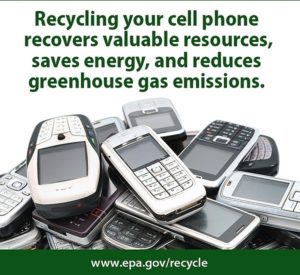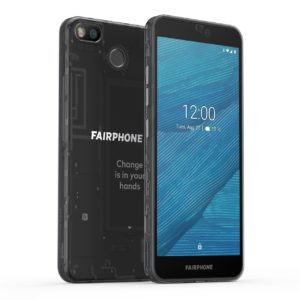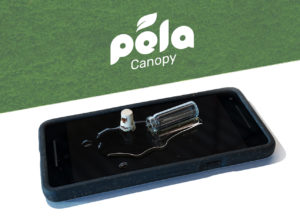The 411 on Cell Phone Sustainability
Cell phones are an everyday item and an almost unavoidable necessity in our society. In 2018, it was estimated 1.5 billion phones were produced with more cell phones active than people on the planet. Unfortunately, our increasing reliance on cell phones poses a number of environmental and social problems. From an environmental perspective, cell phones have an average lifecycle of 18 months and only about 12.5% get recycled, which adds up to a lot of waste and takes precious metals out of circulation.

In addition, phone accessories compound the problem. Most smart phone users invest in cases and screen protectors which are made of plastic that will likely end up in a landfill or in our oceans. While avoiding having a cell phone may not be a practical solution, there are actions everyone can take to help the environment. Through recycling and conscious purchases, we can reduce our waste and our impact.
Disposing of e-Waste and Accessories
 One of the most important steps you can take as a cell phone owner is to properly manage your old phone and cases when you are ready to upgrade. This can involve either selling a still-working outdated model for extra cash, or donating your old phone to a charity that assists developing countries in need of working phones or raises money for causes like domestic violence prevention. Even just returning your device to an authorized e-waste recycling business, like Staples or Best Buy, can prevent your phone from going to a landfill. The manufacturing of cell phones and cases requires a great deal of energy as well as plastics and rare materials. Once in a landfill, chemicals in the batteries can leak into the ground water; the plastic can degrade into dangerous micro plastics, and rare metals will be abandoned.
One of the most important steps you can take as a cell phone owner is to properly manage your old phone and cases when you are ready to upgrade. This can involve either selling a still-working outdated model for extra cash, or donating your old phone to a charity that assists developing countries in need of working phones or raises money for causes like domestic violence prevention. Even just returning your device to an authorized e-waste recycling business, like Staples or Best Buy, can prevent your phone from going to a landfill. The manufacturing of cell phones and cases requires a great deal of energy as well as plastics and rare materials. Once in a landfill, chemicals in the batteries can leak into the ground water; the plastic can degrade into dangerous micro plastics, and rare metals will be abandoned.
 In addition to the adverse environmental effects posed by cell phones in landfills, there are social and environmental issues associated with the mining industry that produce the rare metals used in cell phones. Mining operations damage the environment and workers face questionable working conditions and loss of land rights in developing countries where the ore is sourced. Even when mining efforts are made safer and conditions improved through projects like the Conflict-Free Sourcing Initiative, the costs of mining ethical ore are likely to increase, ultimately resulting in rising cell-phone prices for the consumer. At a minimum, recycling phones allows those precious metals to be reused thus reducing the demand for more.
In addition to the adverse environmental effects posed by cell phones in landfills, there are social and environmental issues associated with the mining industry that produce the rare metals used in cell phones. Mining operations damage the environment and workers face questionable working conditions and loss of land rights in developing countries where the ore is sourced. Even when mining efforts are made safer and conditions improved through projects like the Conflict-Free Sourcing Initiative, the costs of mining ethical ore are likely to increase, ultimately resulting in rising cell-phone prices for the consumer. At a minimum, recycling phones allows those precious metals to be reused thus reducing the demand for more.
Greener Consumer Options

Fortunately, in addition to properly managing your old phone in a sustainable manner, there are other options for reducing your impact. Currently the greenest option (in America) for a phone is a refurbished older model from an authorized retailer. In Europe, Fairphone is taking action to provide a Fair Trade phone, repairable by the consumer, with plans for longevity instead of obsolescence. Cases, screen protectors and associated plastic packaging can’t be recycled, but there are emerging companies dedicated to sustainable solutions.
Pela, for example, is the first compostable case company (home compostable in as little as 6 months) and has cases for most major phones along with a liquid screen protector that comes in a reusable glass bottle. In 2018 Pela sold almost 200,000 cases which prevented 42,504 pounds of disposable plastic from entering the waste stream. Companies are also producing more sustainable cases from wood, bamboo, wheat straw, and even recycled cork.
As zero waste culture grows, consumers can benefit from mission driven companies that offer more sustainable alternatives to our daily needs.






